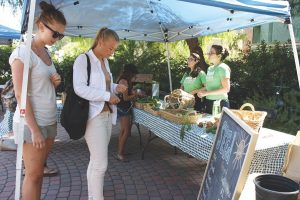
Photo by Stine Norum- Staff Photographer
Fresh produce is available on the California Lutheran University campus to provide students with healthy food choices.
Wellness and the Sustainable Edible Education Project offer CLU’s very own farmers market the last Thursday of every month in front of the Spies-Bornemann Center for Education and Technology. On Sept. 28, Wellness and the SEEd project partnered with the organizations Join the Farm and Bead for Life to put on the market of the school year.
Squash, beets, cabbage, garlic, tomatoes, herbs and leafy greens were sold.
“It’s important to bring fresh produce to campus that is inexpensive for students,” said Jennifer Shipley, the healthy living intern for the Wellness Program.
The SEEd— Project garden provides a portion of the produce available at the market.
The SEEd Project’s webpage state’s that the project’s initiative is to “provide opportunities for students to directly engage in CLU’s sustainability efforts and support the nation-wide movement that encourages people to grow and purchase local produce.”
The garden became part of the SEEd project in September of 2010.
“The garden is basically an outdoor classroom on campus,” said Christina Geldert, a member of the SEEd project. “There is always at least one person working on the garden every day and collectively around 30 hours of work is done a week.”
The SEEd Project had tables set up at the market and volunteers from the project helped to sell produce and to educate students about the food they grow in the garden.
“The SEEd Project is this wonderful thing that combines hands on learning with life-long knowledge of sustainability and organic growing,” said Aliyah Schneider, worker for the SEEd Project garden.
“We began the farmer’s market at CLU because we had all this produce and we didn’t know what to do with it. Once the garden began flourishing we wanted a way to share the fruits of this project with everyone,” Schneider said.
The proceeds that SEEd earns through the market goes directly back to the schools garden.
“Everything goes back to helping the garden,” said Ben Lewenstein, SEEd Project garden worker.
“Since we are a young project we are still building up our sustainability. We have to buy seeds, supplies, event merchandise and provide payment to our employees,” Lewenstein said.
Another vendor that provided produce at the market was a group called Join the Farm. They are farmers from Santa Paula, Calif. who grow their own produce. They have been coming to CLU for the past year to sell their produce at the market and work with the SEEd Project on the garden.
“We have a great relationship with Cal Lutheran,” said Erynn Smith of Join the Farm. “We work closely with Professor Rasmussen who is our President of the Board of Directors at Join the Farm.”
Lettuces, tomatoes, summer squashes, basil, cilantro, corn, peppers and eggplants were just a few of the ingredients Join the Farm provided at the market this Thursday. They also continue to provide farm boxes to the Samuelson Chapel during the week.
Not only was produce sold at the market, there was also an organization called Bead for Life. The organization sold handcrafted jewelry and lip balm that was made by women in Uganda, Africa.
Junior Berlin Galvan, a representative of Bead for Life, said, “All the proceeds go back to the women in Uganda. This is a way for women to have sustainable income and to live a healthy lifestyle.”
The handcrafted jewelry is made out of rolled recycled paper and then brought to the United States to be sold.
Be sure to check out all the produce and products provided at the farmers market. The next market will be on Oct. 24 in front of the Spies-Bornemann Center for Education and Technology.
Emily Behrs
Staff Writer
Published Oct. 2, 2013


